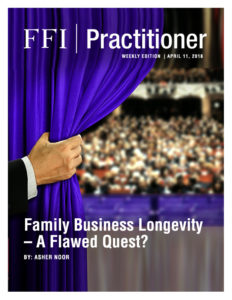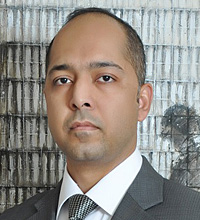
View this edition in our enhanced digital edition format with supporting visual insight and information.
Is the pursuit of longevity by family businesses a flawed goal? Almost every practitioner would strongly answer ‘no!” However, for this week’s edition, Asher Noor has decided to adopt the contrarian position in this provocative and Shakespearean inspired piece. Let the play begin!
Prologue
“And what is the purpose of your visit, Sir” asked the nondescript immigration officer at London Heathrow last February. I mumbled something about a family business offsite.
What followed was a fascinating discussion during which I got a civil servant, with the primary job of thumbing and stamping passports, offering some incredulously articulated opinions. One of the topics that came up in the short tête-à-tête was longevity, and if it makes sense to worry about legacy and successor planning. He believed the quest for longevity is overblown and given too much importance. He also called it selfish.
While his opinion, to which he is entitled, may have merits, it flies in the face of what remains the central thesis of any decent family business practitioner. We try to help support and put in place mechanisms that last beyond mortal lifespans – and for good reasons.
Despite loving the chat, my aim at that time was to get him back to his job, stamp my passport, and let me through. Thankfully the burgeoning queue behind me rushed up the conversation, but in the taxi snaking its way through to central London, I thought what if I were asked to defend the thesis that longevity is a flawed concept. I jotted down points in my taxi ride, and that’s how the following piece came about, where just for argument’s sake, I try advance the edgy and contrarian idea of longevity being a flawed concept.
ACT 1: Is outliving others the ultimate brag?
It seems that the quest for the elusive fountain of youth continues unabated and unashamedly and that logic has never proven to be a barrier. The desire to live forever titillates even people with the dullest of utility, existence or imagination. Not even a passing thought is spared in this fanciful fictionalization of what one plans to do with all this extra time on hand.
Admittedly, we love to celebrate long innings — be it the queen, the “nth season” of a TV series, a centenarian blowing candles on a cake, or the passing of the baton by a long-serving CEO or founder. Longevity is considered a badge of honor, and we usually applaud it as a mark of respect or awe.
However, what if by fawning over longevity, we are missing the unadmired alternative, which may be the underrated fad of the century – “less is more?”
ACT 2: Is longevity a one-way ticket to Destination Taboo?
Let’s replicate this quest for personal longevity onto the corporate world, which over the centuries has been able to codify legal/governance structures that can be handed down over generations, thus surpassing individual life spans.
In the family business world, this business longevity has been applauded ad-nauseum, but haven’t we all seen taboos go mainstream or vice versa? Haven’t we seen ‘scientific research’ paint horns over red-meat or declare innocent the deadly carbohydrates of yesterday?
So, could it be that time has come to question the utility of longevity? If slavery, marijuana, inter-racial marriages or animals in circuses can do 180 degree turns between taboo and mainstream, what’s to stop family business longevity from getting an earful in the coming years — and berated for something that’s currently prized?
ACT 3: Longevity is all about creating really high barriers to entry.
In the past couple of centuries, if a few family businesses have survived, they duly deserve applause for having come through the industrial to the information age of today. The ride was certainly not easy. They deserve kudos for having withstood plagues and world wars. They also deserve acknowledgement for having made it without the founders having gone to university or having the luxury of a bevy of ivy (or non-ivy) league consultants coaching them on how to do business.
At the cusp of the third decade of the 21st century, however, does this family business longevity not start to sound a bit narcissist, greedy, utilitarian, ineffective and unfair? Does it not come across as denying others the right to do the same, or more, in a better, improved fashion?
It reeks bad when we see businesses ring fencing, diminishing world resources and handing them down to their Next Gen instead of letting a new upstart access those diminishing world resources and put them to more efficient usage.
Does it not sound a lot more democratic to open up the game for the new ones – rather than skew it all for people born with the ‘right’ surname?
ACT 4: Longevity is fighting a dying battle against Mother Nature.
From one angle, longevity looks like endurance, but from another angle it looks like being tone-deaf to the laws of nature – which suggest evolution as a better way of sustainability in the long run. Additionally, innovation and disruption are making businesses antiquated and irrelevant in a very short span of time. Incidentally, almost half of the fortune 500 companies that existed in the year 2000 have disappeared today. So much for the quest for longevity!
Do you know how many people die every day globally? About 150,000 daily. Does the world come to a standstill? Yes, certainly for those who lose their loved ones, but time is a great healer. The world continues to spin, and the sun still comes out the next morning.
Mantra is that the world moves on even though the desire to rule even from the grave continues to be seen. Retirement is not a failure. It should be embraced as part of the evolution process. Let’s not let bankruptcy, sibling rivalry, or death alone put the brakes on longevity.
ACT 5: The long shadow of longevity hinders the dawn of a new era.
Why can’t we let people cash out or corporates burn out? Kodak is a dinosaur now, and while we may rue its ineptness to ride the wave of rebirth, did it not give way to new young blood? Maybe it’s better to let seedlings emerge and not stunt their growth or barricade them from exploring novel ideas and conquering new frontiers.
Ironic as it may sound, longevity is nothing more than a relic of the past that’s always up in arms with the new world order. Yes, let’s applaud those who can battle the test and tribulations of time and turn a new leaf, but how about letting the newbies explore and exploit. Let them create their own DNA. Let them shed the skin every generation.
If our goal is to make a footprint, many mortals have done that without progeny and limited utilization of oxygen on planet earth before they left for their heavenly abode. Longevity is certainly not the sole recipe for leaving one’s mark.
Epilogue
Let’s not cloud our judgement by not knowing the difference. What people and corporates want is longevity; but what they end up begging for or seeking is battling for survival because of the fear of oblivion.
Shakespeare penned these immortal words:
All the world’s a stage,
And all the men and women merely players;
They have their exits and their entrances,
And one man in his time plays many parts,
So, when our time’s up, let’s let it be curtains and let a new play begin with a new set of characters. Maybe?
About the contributor
 Asher Noor, ACFBA, is CIO & CFO with AlTouq Group, Saudi Arabia, where he looks after the accounting and finances of Group holding, subsidiary and associate structures, banking relationships and various investments. A member of the FFI board and the FFI Practitioner editorial committee, Asher is also the 2014 recipient of the FFI/EDHEC GEMBA scholarship. He can be reached at [email protected].
Asher Noor, ACFBA, is CIO & CFO with AlTouq Group, Saudi Arabia, where he looks after the accounting and finances of Group holding, subsidiary and associate structures, banking relationships and various investments. A member of the FFI board and the FFI Practitioner editorial committee, Asher is also the 2014 recipient of the FFI/EDHEC GEMBA scholarship. He can be reached at [email protected].
About AlTouq Group
AlTouq Group is a Saudi Arabian family office established in the 1970’s as an investment vehicle for the AlTouq family. It has grown into a sophisticated local and international investor with a global revenue generating asset base.

View this edition in our enhanced digital edition format with supporting visual insight and information.





